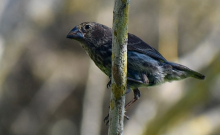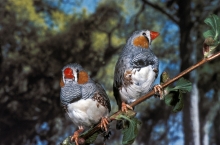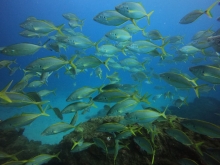
Uncertainty in measuring biodiversity change could hinder progress towards global targets for nature

Researchers from McGill University, led by Professor Alanna Watt of the Department of Biology, have identified previously unknown changes in brain cells affected by a neurological disease. Their research, published in eLife, could pave the way to future treatments for the disease.

Evolutionary biologists have long suspected that the diversification of a single species into multiple descendent species – that is, an “adaptive radiation” – is the result of each species adapting to a different environment. Yet formal tests of this hypothesis have been elusive owing to the difficulty of firmly establishing the relationship between species traits and evolutionary “fitness” for a group of related species that recently diverged from a common ancestral species.

Insect populations are widely influenced by weather anomalies, with decreasing numbers observed during unfavorable conditions and a spike in normal periods, according to a new study. The study published in Nature tries to resolve a debated topic: Are insect populations declining? Several studies have reported a decline in insect populations and diversity while others have questioned this. (Nature)
Here is an expert from McGill University who can provide comment on this issue:

NSERC Alliance Grant supports McGill-led Canadian team, new global climate center on AI for biodiversity change

Spinal cerebellar ataxia 6 (SCA6) is an inherited neurological condition which has a debilitating impact on motor coordination. Affecting around 1 in 100,000 people, the rarity of SCA6 has seen it attract only limited attention from medical researchers. To date, there is no known cure and only limited treatment options exist.
Now, a team of McGill University researchers specializing in SCA6 and other forms of ataxia, have published findings that not only offer hope for SCA6 sufferers but may also open the way to developing treatments for other movement disorders.

Many mammal species living in cold climates tend to have large bodies and short limbs to reduce heat loss – a general pattern known as Bergmann’s rule. However, bats are the exception to the rule, displaying small body sizes in both hot and cold regions. A McGill-led team of researchers is shedding light on this long-standing debate over bats’ body sizes and focus on why bats are seemingly non-conforming to ecogeographical patterns found in other mammals. Their findings offer a new method for investigating complex macroecology across bat species.

Wild populations must continuously adapt to environmental changes or risk extinction. For more than fifty years, scientists have described instances of “rapid evolution” in specific populations as their traits (phenotypes) change in response to varying stressors. For example, Spanish clover has developed a tolerance for copper from the mine tailings in which it grows, and the horn size of Alberta bighorn sheep has decreased due to trophy hunting.

In humans, the dopamine system has been tied to rewards and pleasurable sensations. As well as to memory and learning. A recent study from McGill University, published in Current Biology, suggests that dopamine may also play a key role in shaping what songs female songbirds enjoy, which may ultimately affect mating as females choose (and then remember) their mates based on the songs they prefer.

Researchers at McGill University have shown that a brain cell structure previously thought to be pathological in fact enhances cells’ ability to transmit information and correlates with better learning on certain tasks.
In a study published in Nature Communications, the team investigated swellings that occur in the axons of Purkinje cells in the cerebellum. In results that contradict established expectations, they found that axons with swellings did a better job of conducting electrical signals than those without.

As the global community is called to re-examine our relationship to the natural world, one thing is certain: despite all our technological advances, humans are completely dependent on healthy and vibrant ecosystems for water, food, medicines, clothes, fuel, shelter, and energy, just to name a few. The 2021 theme, “We’re part of the solution”, was chosen to be a continuation of the momentum generated last year under the over-arching theme, “Our solutions are in nature”, which served as a reminder that biodiversity remains the answer to several sustainable development challenges.

Tropical coral reefs are the most biodiverse underwater ecosystem, providing a home to more than a quarter of all marine species. No strangers to environmental stressors and the on-going impacts of climate change, the survival of corals has increasingly been under threat in recent years. A collective of researchers, including from McGill University, have analyzed how environmental factors influence the growth and health of corals and found that more species of corals are living in the mangrove forests than in nearby shallow reefs.

Researchers from McGill University and the University of California, San Francisco have developed a new algorithm capable of identifying features of male zebra finch songs that may underlie the distinction between a short phrase sung during courtship, and the same phrase sung in a non-courtship context.

Picture a flower: what do you see? A bright and showy splash of contrasting colours? Well, not all plants produce flowers that are only like that. Some plant species actually produce two types: “normal” ones that look great, and “runts” that are small, never open and, rather than attract pollinating insects, instead pollinate themselves.

Warming ocean waters could reduce the ability of fish, especially large ones, to extract the oxygen they need from their environment. Animals require oxygen to generate energy for movement, growth and reproduction.
